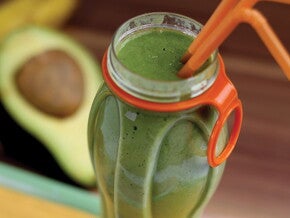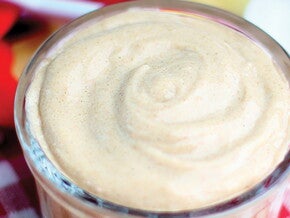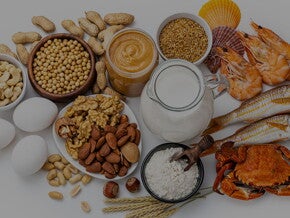
Make every bite count for baby’s healthy growth and development
Starting your little on solid foods is quite a milestone! Since his tummy is so small, and breastmilk is the main source of his nutrition, at 6 months of age he will only be taking small tastes of foods.
Small tummy
Starting your little on solid foods is quite a milestone! Since his tummy is so small, and breastmilk is the main source of his nutrition, at 6 months of age he will only be taking small tastes of foods. Even these beginning bites are important to his healthy growth and development for he has high needs for nutrition, but only a small stomach that may be filled quickly.

Babies have different nutritional needs than older children and adults
Considering your baby’s weight, compared to that of a child or adult, he has much higher needs for several nutrients, especially minerals and vitamins. At about six months, when the iron stores that your baby was born with become low, your baby will require a source of iron in addition to breastmilk. Iron fortified infant cereal, or meat, are often recommended as one of baby’s first foods, because they are such a good source of iron.
Breastmilk + solid foods
As your baby is learning new flavors and textures, breastmilk is still the main source of his energy needs. At 6-8 months, breastmilk continues to provide most of his calorie needs (about two-thirds). By 9-12 months, when he is consuming more solid foods, breastmilk will provide about half of his energy needs.
Your baby will drink as much breastmilk as he needs, and from 6 – 12 months you will see that as his appetite for solid foods increases, and he will consume less breastmilk. Offer him foods that are high in the nutrients his growing body requires, especially nutrient rich foods like iron fortified infant cereal and meats, as well as fruits and vegetables for other minerals and vitamins. Remember to respect his hunger and satiety cues by not pressuring him to eat when he shows you that he is no longer hungry. Another meal will come soon, and your baby may be more hungry at that time.
Protein is important for growth, health, and so much more
By six months of age, your baby has likely doubled his birth weight and by his first birthday he will have tripled his birth weight, and increased his height by half. This first year will be the most rapid growth of his life. One of the key nutrients for your baby is protein. Protein, essential for healthy growth and brain development, may be one of the most important nutrients that your baby consumes.
Protein also plays an important role in both a healthy digestive system and a healthy immune system. There is no need to worry about your baby’s protein intake - breastmilk provides just the right mix of high quality protein in the amounts needed for your growing baby. And, new science shows that the levels of protein in breast milk may also help your child achieve a healthy weight.
Solid foods are needed
The introduction of solid foods is not meant to replace breastmilk, but rather as a complement to the nutrition in breastmilk - which is why first foods are often referred to as complementary foods.
By about 6 months of age, introduction of nutrient rich solid foods is important for the following reasons:
- Provides a source of nutrients your baby requires, in addition to breastmilk.
- Teaches baby to eat from a spoon.
- Introduces baby to flavors and textures to help him learn acceptance of these new nutritious foods.
- Delayed introduction of solid foods may increase the risk of food allergy or eczema; ask your health care provider when an initial taste of allergenic complementary foods can be introduced to your baby.
Make every bite count
When selecting foods for your baby, remember that his stomach is small. He has little room for foods that don’t provide necessary nutrients. If you offer him sweetened foods or beverages, his tummy may fill up on those foods and he will no longer have room for the nutrient-rich foods that he needs.
As he becomes familiar with a variety of tastes and textures, and as he gets closer to a year of age, he will be eating more solid foods. His daily intake should include fruits, vegetables, meats and grains, in addition to breastmilk.


















